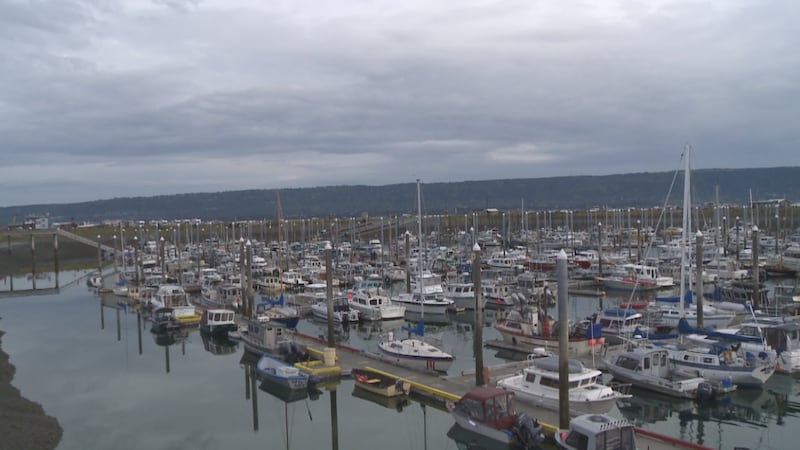APD Chief Sean Case says still no need for civilian oversight for officer-involved shootings as first year approaches
ANCHORAGE, Alaska (KTUU) - A full academy in years and no need for a civilian oversight committee were top of mind during Alaska’s News Source’s interview with Anchorage Police Chief Sean Case, who was sworn into his role roughly a year ago on July 1, 2024.
“There’s a lot of progress that we made, a lot of forward momentum that we’ve done,” Case said. “We look forward to our June Academy, we’re looking to have a full Academy, which we haven’t done that in five years. That says the kind of, the message that we’re getting out, the recruitment, the engagement that we’re doing, the public, it’s having an impact. I think it’s been a successful year, but we’re not done yet.”
In response to a series of officer-involved shootings from last summer, starting with Kris Handy in May of 2024, Case was quick to modify conditions within the existing police worn body-camera policies following much public outcry that the existing policy significantly lacked transparency.
But following the August officer-involved shooting that claimed the life of 16-year-old Easter Leafa, demands from the public for a civilian oversight committee increased.
One month prior to Leafa’s death, Case had gone on record to say that, in his opinion, it wasn’t the right time to form a civilian oversight committee. When asked during Alaska’s News Source’s Thursday interview if he still felt the same way, he said he did, adding that it was his belief that no outside civilian committee could hold itself to higher standards than the department currently does.
“We have an extremely high expectation of the way our employees perform their jobs and they interact with the public, and in some of those investigations that we do are really around like a culture that we’ve built here,” Case said
“We look at the conduct, we look at our level of expectation. There’s not going to be a policy that’s exactly verbatim for some of these complaints. When we look at our employees and say, ‘Hey, you didn’t quite meet the standards that we set.’ To have an outside entity come and do that high-level and quality of investigations and really understand that culture and that expectation, even though it’s not written down in a piece of paper in a form, they’re never going to meet that standard that we hold ourselves to.”
While there was no civilian oversight committee formed in response to public demand, one thing that was formed was a community advisory committee, which consisted of various residents representing groups within the community that might not have always had immediate access or communication with police in the past.
Case said that the committee no longer meets on regularly scheduled times but rather has transitioned into an open-door policy with those same individuals.
Case also touched on the successes of APD’s pilot program called Homeless Outreach Prevention and Engagement (HOPE).
Since the team’s inception in late August of 2024, the HOPE team has made 1335 contacts with individuals and successfully connected 124 people with shelter or housing while helping at least 12 others access substance abuse treatment.
Most recently, the HOPE team assisted a family living at the Davis Park homeless encampment to find long-term housing.
Davis Park has been at the center of recent controversy with many from the public urging the LaFrance administration to move forward with abatement efforts. Those public pressures came primarily after recent fatal shootings and a large fire in February.
In response to rising fire concerns, Anchorage Mayor Suzanne LaFrance introduced an ordinance that could expand criminal charges for a larger range of negligent burning within the municipality.
Anchorage municipal code already prohibits “criminally negligent burning” that damages the property of another, making it a class A misdemeanor.
The new ordinance adds to that code, specifically prohibiting a person from lighting or building fires on another person’s property without consent, on sidewalks, or in violation of a burn ban.
“The reason for this proposed change is that the municipality needs meaningful legal tools to deter dangerous fires,” LaFrance told Alaska’s News Source on Wednesday.
A person found in violation of the code could face up to a year in jail if convicted, but LaFrance said that would not necessarily always be the case, and that people can be cited for violations.
If charges are issued for such a crime, LaFrance said she felt confident they could be followed up on.
As far as APD’s response should the ordinance pass, Case said he’s confident officers could provide an adequate response and overall supports the mayor’s efforts to mitigate fire dangers by potentially enforcing harsher punishments.
“I think over the last several years we’ve been as a municipality, we’ve been having a higher focus on the fire danger that we have,” Case said.
“Certainly, that’s been a big push this year with the lack of snow that we’ve had throughout the winter months. This is just a tool that we’re trying to get ahead of the game so that we can, first of all, use it as a deterrent because I think that plays a role in this, but second of all, we do want people to get the message that having a fire in a place you’re not supposed to have a fire when there’s a higher fire danger creates a substantial risk to property and in the safety of people.”
See a spelling or grammar error? Report it to web@ktuu.com
Copyright 2025 KTUU. All rights reserved.














